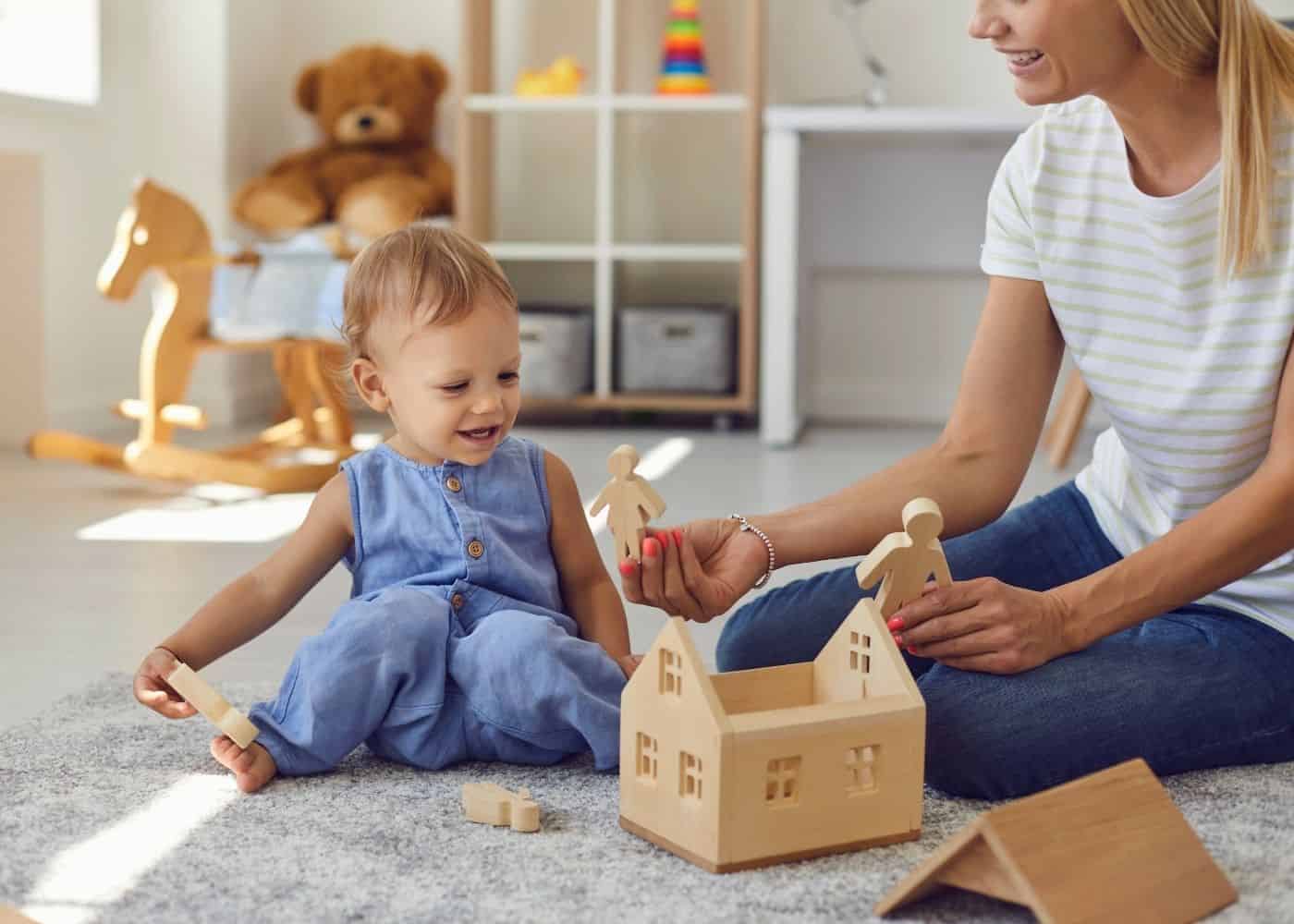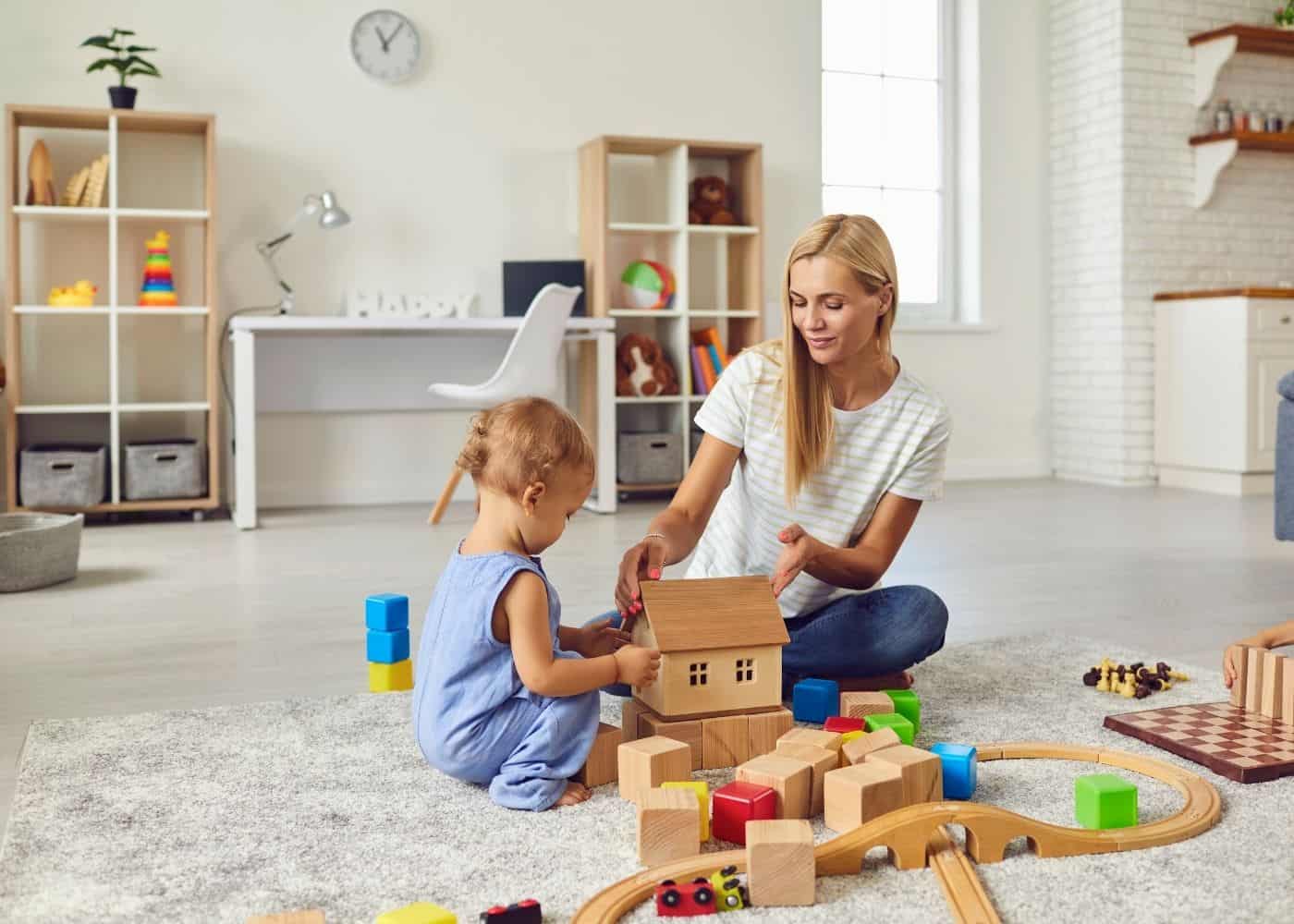If you like caring for children, watching them grow and learn, and you have a talent for working with little ones, then nannying is a fantastic job. And, after more than a few years of working in the industry, this nanny happens to have quite a few tricks up her sleeve. So, here are some things I wished I had known on my first day on the job!
This advice is great if you are a beginning nanny or babysitter, by the way!

Hey Mamas – Did you just hire a nanny for your family? Don’t miss out on our Nanny Binder editable template! These printable binder pages will help you streamline communication with your nanny and will provide them with all of your family’s information, including children’s schedules, health information, and emergency contact info.
Toddlers, which are children aged between 12 and 36 months, are going through a fascinating stage of cognitive, physical, social, and emotional growth. They’re at an age where they are eager to explore and understand the world around them, are quickly learning their independence, and are so full of energy. As fun as they are, though, toddlers are also busy. Caregivers must always have an eye on the children and understand how to care for them age-appropriately.
Before we get into the tips and tricks, let’s talk about things to be mindful of when working with this age group!
1. Stay within your boundaries
If you’re not comfortable caring for such young children, then respect that! It’s best to work with older-aged children at first, especially if you aren’t around toddlers or babies much in general.
Up to the challenge anyway? Great! But if you’re nervous, there’s no shame in talking about any apprehensions you have with your potential employer. I suggest arranging a working interview, or you could set up a “trial day” where you provide care over a short period, rather than a full day before committing to the family.
2. Understand the child’s needs
Ask important questions and get to know routines
There are a few key questions I always try to ask when I start nannying for a new family. Things like diet (especially allergies!), daily routine, and any specific care needs are essential to know before you start. Proactively meeting a child’s needs will make your day much smoother and keep the littles happier, too! And, you never want to undermine the parent’s by contradicting their routines.
Allergies
I once cared for a child with very intense contact allergies. She had an allergic reaction while at the park – The reason she was alright was I had all of the contact info on hand and had already chatted with the parents about what to do.
If allergies are a concern, be sure to record the contact information of the child’s doctor and to know how to respond with first aid.
Handling tough behaviour
Check-in with the parents to see how they prefer you handle discipline for ‘bad behavior’, too. This helps provide consistency for the family. Little ones like to test limits, so it’s important to follow through with whatever the parents do. I always ask about time-outs (or alternatives!), what is unacceptable behavior for them, and check-in to see how they want you to respond to aggressive behavior.
Trust me, parents prefer you chat with them about this before it’s an issue! Younger children are learning how to navigate complex emotions and feelings, and you having an understanding of the house ground rules and what is on or off-limits will help everyone feel more comfortable.
Potty training
Potty training habits are something else to check in about. You’ll want to support any potty training the family is doing at home. For babies, I always bring a small toy (usually something that makes noise) to distract them during a diaper change. This is especially helpful for wiggly babies that don’t like to sit still for a diaper change!
Be aware of health needs
Be aware of any health needs (like medication). You should also know where a First Aid kit is in case of an emergency (or better yet, bring your own first aid kit!).
Toddlers are also at risk of choking hazards because they often put things in their mouths. It’s super important to be aware of this! To avoid any accidents, be mindful of their surroundings so that you can remove hazards before there’s a problem.
Be aware of dietary needs, too
Many parents have preferred foods and meal times for their kiddos. Ask the parents which times they prefer they eat, common snacks or favorite meals, and which foods are allowed. I’ve cared for kids who are allowed zero processed foods and sugars and families that don’t mind which food the child picks. Totally up to them! Just make sure the kids don’t go an extended period without food – They will turn into hungry monsters!
Memorize their sleeping schedule
Whether you are nannying in the early morning before the kids wake up, will be there for nap time, or will be putting them to bed, it’s highly possible you’ll need to know their sleep schedule. Most small children will require naps (but not all will!), whether that be a morning nap or a mid-day snooze.
Healthy sleep habits require consistency, so it’s important to ask the parents about these routines. Is there a classic nursery rhyme that the kids love? When the baby/kids are sleeping, is it okay for you to clean and do house tasks?
3. Take a basic first aid, foodsafe, or a babysitting course
Being trained in any of these things is super helpful. I’d advise you to investigate what’s available in your area and sign up for a course if you haven’t already! For example, the Red Cross offers an excellent Babysitting training program worth checking out.
4. Always have important contact information
As a nanny, you should always know who to call in case of an emergency. Whether you’re putting the numbers into your personal phone or there is a list posted on the fridge, make sure to have this on hand.
If there is a play date arranged while you are on shift, be sure to get the contact information of the other parents, too.

Now that the basics are covered, let’s talk about the fun stuff! Here are the top tips that I’ve picked up over my years of nannying.
5. Open communication with parents
Parent/guardian communication is key. The end of your shift is a good time to relay any necessary information from the day. Things to talk about include: Did the toddler nap? Were there any incidents in the day?
Some parents may ask you to give them a mid-day update. Make sure you’ve got your phone charged to do so if that’s the case!
6. Accidents happen – So be prepared
Toddlers can get into unexpected trouble. They’re also still learning the limitations of their bodies! Falls, scrapes, and scratches may happen during the day. Try your absolute best to prevent any accidents but be prepared to handle them calmly if they do.
If you witness a child fall or mildly hurt themselves, remember that they’re always looking for your reaction! Try your best not to overreact. “Nice fall! Are you alright?” is usually what I say first if they take a small tumble. If you react by looking scared, it will make them feel the same.

7. Check their diapers often
Chances are, you’ll be changing diapers if you’re working with toddlers. Be sure to check their diapers often – If you notice it sagging, bulging, or you smell an odor – Check to see if they need a change.
Are you working with a recently potty-trained child? Help them avoid accidents by being sure to ask them to use the potty any time you’re leaving the house, before napping/going to bed, and just asking frequently in general.
A big thing I’ve noticed over the years is how involved children can get in their activities. Sometimes they may be so invested in their activity that they won’t notice warning signs on their own. Watch for signs like the tell-tale “pee-pee dance,” them touching/pulling on their diapers, or crossing their legs. These are all indicators that they’ve got to go!
Usually, little ones will have to urinate within an hour of drinking fluids. If you’ve just had lunch or they’ve just had a large gulp of water, be sure to ask them over the next hour if they have to go.
8. Avoid the word “No”
“No” can be a very triggering word for little ones, and sometimes results in an immediate meltdown. Using language that redirects undesirable behavior like “Oh! We can’t throw toys in the house. Would you like to go outside and throw a ball?” guides children in the right direction without causing as much upset.
Validate the child’s feelings first before telling them why what they’re doing is unacceptable. For example, another child stole a toy from the toddler you’re watching, and in retaliation, they hit the child. Rather than saying “No hitting!” I would advise trying, “I understand why you’re mad, but please use your gentle hands.” Or “Even if you’re feeling mad, you may not hit your friends.” My go-to when I’ve seen a child hit is this: “We use our words, not our hands, please.”
9. Never leave the children unsupervised
Like babies, toddlers need to be watched at all times. They are exploring a whole new exciting world now that they can walk – Which means they can get into unsafe situations quite quickly as they learn their own limitations. Many mistakes/accidents can be avoided by diligent supervision.
10. Give options
Giving a child autonomy over their day not only reduces meltdowns caused by feeling like they’re being bossed around, but it helps them feel empowered too. This can be as simple as asking “Would you like to wear the green t-shirt or the white t-shirt today?”
When you’ve got to get a lot done in a day, giving the toddler choice over what happens can also make things go much smoother. Try asking, “Would you like to brush your teeth first or make your bed first?” and honoring what they decide. Both options are beneficial for you, but feeling like they’re in control makes them more willing to participate.

11. Respect the home
Your employer’s home is your workplace. Be sure to clean up any mess made in the day and use any extra spare time to help with household chores. Every family’s expectation will be different, but I always try to leave the home as clean as possible at the end of each day.
If you know the children have activities the following day, ask the parents how you can help! Perhaps you could pack a lunch with the little ones, help pack bags for a trip, or whatever else will make your bosses day easier once they’re home.
12. Encourage toddler independence
Toddlers are so fiercely independent – In fact, this is one of my favorite qualities about them! They’re learning all of the basic self-help skills at this age, such as getting dressed, practicing hygiene, and learning how to help with household tasks.
It’s not uncommon, though, for little ones to get frustrated while they learn these things! Learning to put boots on can be frustrating – Encourage them, give them high fives and clap when they get things right, and tell them how proud you are when they complete tasks on their own. If they get mad and exclaim, “I can’t!” my favorite response is, “You can’t – yet! Keep on trying!”
I always tell children that if they try and get stuck, I’m here to help, but I want to see them try first.
13. Be patient
Things like getting dressed, getting ready for bed, or even just walking to the park take a bit more time with toddlers. Be patient with the little ones and give yourself lots of extra time for activities so they don’t feel rushed. Feeling calm puts them in a better space to learn, so provide them with the grace of time while they’re trying to complete a task.
14. Be prepared with age-appropriate activities
Not only will the little ones adore you if you show up with pre-planned activities, but you won’t have to spend time crafting or activity prepping while they wait. Toddlers have quite short attention spans, so just a few seconds of waiting can result in lost focus! Make sure whatever engaging activities you’re working on are age-appropriate, too. Tasks that are too easy will be boring for them, whereas too difficult of a task may result in frustration and upset.
Daily outdoor time is great for any age. This lets them get energy out and more actively explore the world around them!
Screen time is a no-go in my nanny books. You are being paid to care for, entertain, and teach the children. If they ask, you can remind them that they can ask their parents when your day together is finished, then promptly suggest another activity. The only time I make an exception to this is for “learning videos where we talk about/learn about a specific topic or animal and then watch a video to supplement learning. I do this after we’ve learned together to try to answer any lingering wuestions they may have\
15. Stick to a schedule
Toddlers thrive in routine. Try to stick to either the parent’s schedule or have one of your own that you do every day. Don’t be too rigid, though! Sometimes activities don’t go as planned, and that’s OK! Just move on to your next activity and come back to it later.
16. Toddler snacks!
Little ones may eat less at every meal, but they do need to eat frequently. I always make sure to have snacks available if the little ones are hungry. If going out for the day, make sure to pack healthy and nutritious snacks that will fill the toddlers with energy for the day and keep them from feeling grumpy (toddlers get hangry too, you know!)
Few toddlers will ask for water when they need it. Always have a water bottle around and give them gentle reminders to hydrate throughout the day.
17. Comfort the child, always
Growing up can be hard work. A child must know you are there to support them unconditionally. The toddler stage can be exceptionally tough because they cannot yet vocalize all of the very complex feelings they experience in a day. Sometimes this looks like lashing out, meltdowns, or being defiant, but all of it is easier to navigate when they know you’re there to help them.
I always offer open arms first. I make sure the child is okay and feels safe, then talk to them about what is going on.
If a child is really upset, try singing to them. Singing a comforting song and rocking them may be all they need to feel better again. Or make them laugh! It’s much harder to cry when you’re smiling.
18. Be ready to have fun and get messy!
Encouraging play-based learning is terrific for children’s development at this age. They are highly imaginative and (usually) love hands-on learning. Show up for your shift ready to explore the world with them, from jumping in mud puddles to messy craft creations. It will likely be the highlight of both of your days.

Leave a Reply